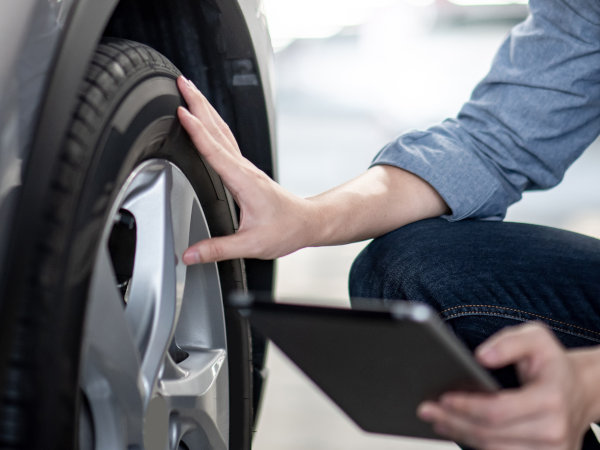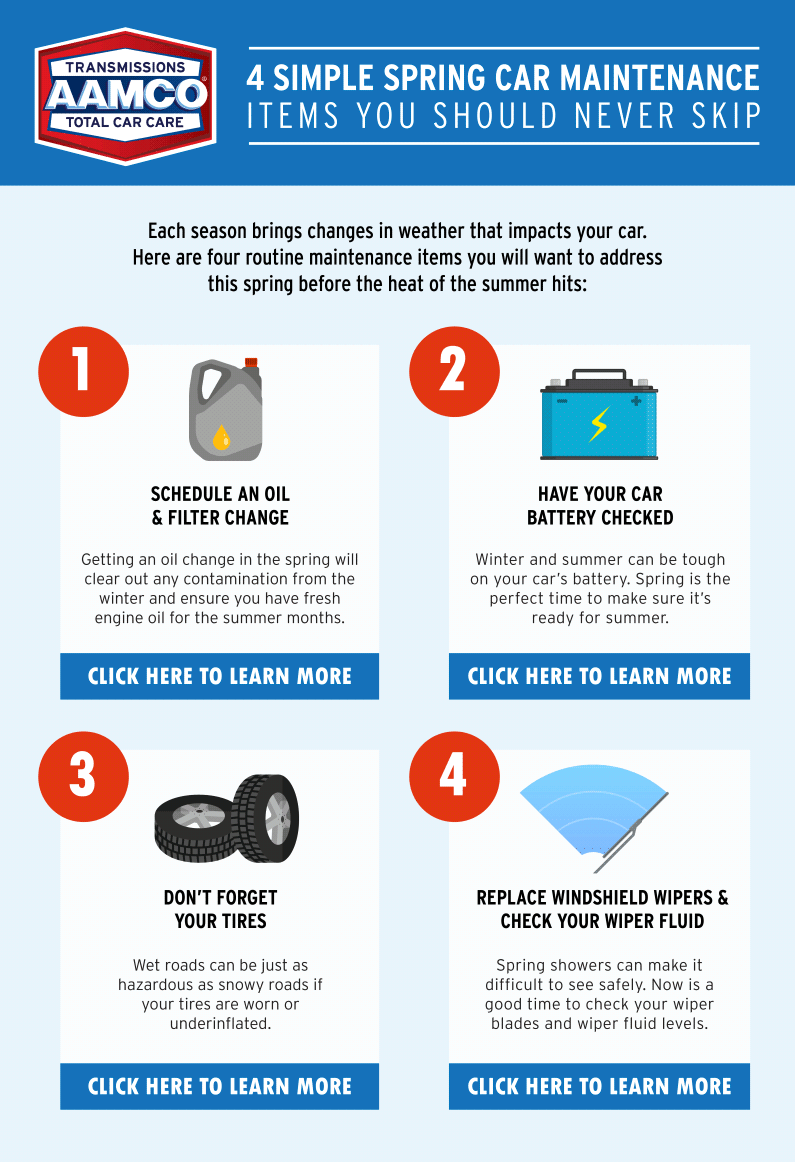4 Simple Car Maintenance Items You Should Never Skip
Avoid expensive car repairs and maintain your vehicle's safety by keeping up with these four simple car maintenance items.
AAMCO | 04/25/2022
We all know that sinking feeling when something goes wrong with our car, and we realize we will have to take it in for repairs.
That is why it’s so important to keep your car in excellent working order.
Proper maintenance means more than keeping the gas tank full and the occasional car wash. Neglecting simple maintenance tasks can lead to big problems down the road—and big repair bills.
There are four essential maintenance items you should never skip if you want to keep your car running well for years to come.
4 Simple Car Maintenance Items You Should Never Skip
1. Schedule an Oil and Filter Change
Your vehicle’s oil is its lifeblood. It lubricates the engine, keeps it cool, and helps to remove impurities.
Over time, however, oil breaks down and becomes less effective. That’s why it’s important to change your car’s oil and filter according to the manufacturer’s recommendations.
When oil isn’t changed regularly, it can lead to sludge build-up and overheating. This can cause serious damage to your engine and potentially costly repairs.
Similarly, if your filter becomes clogged, it can restrict oil flow to your engine, causing potential overheating and damage.
Most manufacturers recommend changing your vehicle’s oil every 5,000 miles or so. However, this may vary depending on your vehicle’s make, model, and driving habits. Be sure to consult your owner’s manual for specific recommendations.
2. Have Your Car Battery Checked
Your car battery is what provides the electricity needed to start your engine. It also powers all the electrical accessories in your vehicle, such as the lights, radio, and windshield wipers.
A battery typically lasts for three to five years. However, extreme temperatures, short trips, and other factors can shorten its lifespan.
It’s essential to have your battery checked regularly to ensure it’s in good working order. A battery that is starting to fail will show signs of:
Corroded terminals: Corrosion builds on the terminals over time from exposure to heat and battery acid. This white, powdery substance can prevent the electrical current from flowing freely.
A slow cranking engine: If it takes longer than usual for your engine to start, it may signify that your battery is losing its ability to hold a charge.
Your Check Engine Light pops on: If your Check Engine Light (CEL) comes on but you don’t notice any obvious issues, you could have battery trouble.
Dim exterior and interior lights: If your headlights seem dimmer than usual, it could be due to a dying battery.
If you notice any of these signs, it’s time to have your battery checked by a professional. Replacing a battery is typically a quick and easy job, and it’s much cheaper than being stranded with a dead battery.
When you get your battery changed by a professional mechanic, they will take your old battery and recycle it. This helps to keep harmful chemicals out of the environment.
3. Don’t Forget Your Tires
Tires take quite a beating, and they are one of the most critical safety features on your car. Tires are the only part of your vehicle that touches the road, so it’s important to make sure they are in good condition.
Checking your tires regularly is easy to do, and it can help you avoid a blowout or other catastrophic failure. There are many ways that your tires may show signs of wear, such as:
Cracks or splits in the sidewalls: These can be caused by sun damage, driving on rough roads, or simply age. If you see any cracks, it’s time to replace your tires.
Bulges or blisters: These are usually caused by hitting a pothole or curb. They can weaken the tire and lead to a blowout.
Uneven and excessive tread wear: This can be caused by misaligned wheels, over-inflation, or under-inflation. It’s important to have your tires rotated and balanced every 5,000 miles to prevent uneven wear.
Unexpected tire issues can appear instantly. Build a routine of checking your tires before every drive. Look for signs of damage and check the air pressure. Keep a spare tire in your trunk so that you aren’t stranded when tire problems arise!
4. Replace Windshield Wipers and Check your Wiper Fluid
Windshield wipers are an often-overlooked part of your car - until it's an emergency. The last thing you want to deal with is a sudden downpour and no way to clear your windshield.
Windshield wipers are made of rubber, so they naturally degrade over time. They may also wear down prematurely if exposed to harsh sunlight or extreme cold. For this reason, it’s crucial to inspect your wipers regularly and replace them as needed.
When your windshield is snow-covered or frozen with ice, do not use your wipers to try to clear it. This can damage the blades and motor. Instead, use a brush or scraper to remove the ice.
Once you have new windshield wipers, keep them in good working order by regularly checking your wiper fluid levels.
Wiper fluid helps keep your windshield clean with each wipe and helps remove any snow, ice, or bugs that may be stuck to the glass. The unique formula of wiper fluid helps it resist freezing in cold weather.
To check the wiper fluid level, locate the reservoir under your hood and look at the fill line. If it’s low, add more until it reaches the fill line. You can use any type of windshield washer fluid, but make sure it is rated for your climate.
If you live in a cold climate, be sure to use a windshield washer fluid that is rated for freezing temperatures. This will help prevent your fluid from freezing in the reservoir and lines.
And always keep a bottle of wiper fluid in your trunk so that you’re always prepared!
Stay On Top of Maintenance with a Trusted Mechanic
Car maintenance is important for the safety of you and your passengers as well as the longevity of your vehicle.
By regularly checking and servicing these four vital items, you can avoid costly repairs and keep your car running smoothly:
- Schedule an Oil and Filter Change
- Have Your Car Battery Checked Regularly
- Don’t Forget Your Tires
- Replace Windshield Wipers and Check your Wiper Fluid
The best way to ensure your car is always in tip-top shape is to keep up with all your maintenance needs by visiting an AAMCO Center near you. We can help you keep your vehicle up-to-date and spot any potential problems before they become serious. Make an appointment today!



